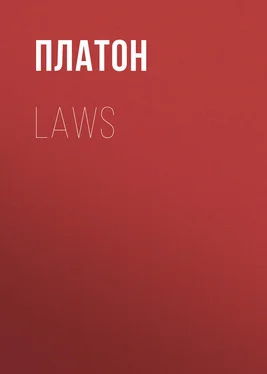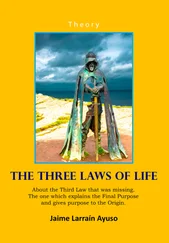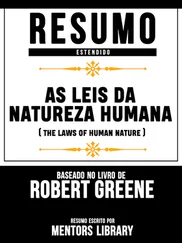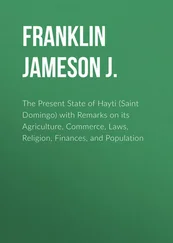Платон - Laws
Здесь есть возможность читать онлайн «Платон - Laws» — ознакомительный отрывок электронной книги совершенно бесплатно, а после прочтения отрывка купить полную версию. В некоторых случаях можно слушать аудио, скачать через торрент в формате fb2 и присутствует краткое содержание. Жанр: Философия, foreign_antique, foreign_prose, на английском языке. Описание произведения, (предисловие) а так же отзывы посетителей доступны на портале библиотеки ЛибКат.
- Название:Laws
- Автор:
- Жанр:
- Год:неизвестен
- ISBN:нет данных
- Рейтинг книги:5 / 5. Голосов: 1
-
Избранное:Добавить в избранное
- Отзывы:
-
Ваша оценка:
- 100
- 1
- 2
- 3
- 4
- 5
Laws: краткое содержание, описание и аннотация
Предлагаем к чтению аннотацию, описание, краткое содержание или предисловие (зависит от того, что написал сам автор книги «Laws»). Если вы не нашли необходимую информацию о книге — напишите в комментариях, мы постараемся отыскать её.
Laws — читать онлайн ознакомительный отрывок
Ниже представлен текст книги, разбитый по страницам. Система сохранения места последней прочитанной страницы, позволяет с удобством читать онлайн бесплатно книгу «Laws», без необходимости каждый раз заново искать на чём Вы остановились. Поставьте закладку, и сможете в любой момент перейти на страницу, на которой закончили чтение.
Интервал:
Закладка:
My first observation is, that your lawgiver ordered you to endure hardships, because he thought that those who had not this discipline would run away from those who had. But he ought to have considered further, that those who had never learned to resist pleasure would be equally at the mercy of those who had, and these are often among the worst of mankind. Pleasure, like fear, would overcome them and take away their courage and freedom. 'Perhaps; but I must not be hasty in giving my assent.'
Next as to temperance: what institutions have you which are adapted to promote temperance? 'There are the common meals and gymnastic exercises.' These are partly good and partly bad, and, as in medicine, what is good at one time and for one person, is bad at another time and for another person. Now although gymnastics and common meals do good, they are also a cause of evil in civil troubles, and they appear to encourage unnatural love, as has been shown at Miletus, in Boeotia, and at Thurii. And the Cretans are said to have invented the tale of Zeus and Ganymede in order to justify their evil practices by the example of the God who was their lawgiver. Leaving the story, we may observe that all law has to do with pleasure and pain; these are two fountains which are ever flowing in human nature, and he who drinks of them when and as much as he ought, is happy, and he who indulges in them to excess, is miserable. 'You may be right, but I still incline to think that the Lacedaemonian lawgiver did well in forbidding pleasure, if I may judge from the result. For there is no drunken revelry in Sparta, and any one found in a state of intoxication is severely punished; he is not excused as an Athenian would be at Athens on account of a festival. I myself have seen the Athenians drunk at the Dionysia – and at our colony, Tarentum, on a similar occasion, I have beheld the whole city in a state of intoxication.' I admit that these festivals should be properly regulated. Yet I might reply, 'Yes, Spartans, that is not your vice; but look at home and remember the licentiousness of your women.' And to all such accusations every one of us may reply in turn: – 'Wonder not, Stranger; there are different customs in different countries.' Now this may be a sufficient answer; but we are speaking about the wisdom of lawgivers and not about the customs of men. To return to the question of drinking: shall we have total abstinence, as you have, or hard drinking, like the Scythians and Thracians, or moderate potations like the Persians? 'Give us arms, and we send all these nations flying before us.' My good friend, be modest; victories and defeats often arise from unknown causes, and afford no proof of the goodness or badness of institutions. The stronger overcomes the weaker, as the Athenians have overcome the Ceans, or the Syracusans the Locrians, who are, perhaps, the best governed state in that part of the world. People are apt to praise or censure practices without enquiring into the nature of them. This is the way with drink: one person brings many witnesses, who sing the praises of wine; another declares that sober men defeat drunkards in battle; and he again is refuted in turn. I should like to conduct the argument on some other method; for if you regard numbers, there are two cities on one side, and ten thousand on the other. 'I am ready to pursue any method which is likely to lead us to the truth.' Let me put the matter thus: Somebody praises the useful qualities of a goat; another has seen goats running about wild in a garden, and blames a goat or any other animal which happens to be without a keeper. 'How absurd!' Would a pilot who is sea-sick be a good pilot? 'No.' Or a general who is sick and drunk with fear and ignorant of war a good general? 'A general of old women he ought to be.' But can any one form an estimate of any society, which is intended to have a ruler, and which he only sees in an unruly and lawless state? 'No.' There is a convivial form of society – is there not? 'Yes.' And has this convivial society ever been rightly ordered? Of course you Spartans and Cretans have never seen anything of the kind, but I have had wide experience, and made many enquiries about such societies, and have hardly ever found anything right or good in them. 'We acknowledge our want of experience, and desire to learn of you.' Will you admit that in all societies there must be a leader? 'Yes.' And in time of war he must be a man of courage and absolutely devoid of fear, if this be possible? 'Certainly.' But we are talking now of a general who shall preside at meetings of friends – and as these have a tendency to be uproarious, they ought above all others to have a governor. 'Very good.' He should be a sober man and a man of the world, who will keep, make, and increase the peace of the society; a drunkard in charge of drunkards would be singularly fortunate if he avoided doing a serious mischief. 'Indeed he would.' Suppose a person to censure such meetings – he may be right, but also he may have known them only in their disorderly state, under a drunken master of the feast; and a drunken general or pilot cannot save his army or his ships. 'True; but although I see the advantage of an army having a good general, I do not equally see the good of a feast being well managed.' If you mean to ask what good accrues to the state from the right training of a single youth or a single chorus, I should reply, 'Not much'; but if you ask what is the good of education in general, I answer, that education makes good men, and that good men act nobly and overcome their enemies in battle. Victory is often suicidal to the victors, because it creates forgetfulness of education, but education itself is never suicidal. 'You imply that the regulation of convivial meetings is a part of education; how will you prove this?' I will tell you. But first let me offer a word of apology. We Athenians are always thought to be fond of talking, whereas the Lacedaemonian is celebrated for brevity, and the Cretan is considered to be sagacious and reserved. Now I fear that I may be charged with spinning a long discourse out of slender materials. For drinking cannot be rightly ordered without correct principles of music, and music runs up into education generally, and to discuss all these matters may be tedious; if you like, therefore, we will pass on to another part of our subject. 'Are you aware, Athenian, that our family is your proxenus at Sparta, and that from my boyhood I have regarded Athens as a second country, and having often fought your battles in my youth, I have become attached to you, and love the sound of the Attic dialect? The saying is true, that the best Athenians are more than ordinarily good, because they are good by nature; therefore, be assured that I shall be glad to hear you talk as much as you please.' 'I, too,' adds Cleinias, 'have a tie which binds me to you. You know that Epimenides, the Cretan prophet, came and offered sacrifices in your city by the command of an oracle ten years before the Persian war. He told the Athenians that the Persian host would not come for ten years, and would go away again, having suffered more harm than they had inflicted. Now Epimenides was of my family, and when he visited Athens he entered into friendship with your forefathers.' I see that you are willing to listen, and I have the will to speak, if I had only the ability. But, first, I must define the nature and power of education, and by this road we will travel on to the God Dionysus. The man who is to be good at anything must have early training; – the future builder must play at building, and the husbandman at digging; the soldier must learn to ride, and the carpenter to measure and use the rule, – all the thoughts and pleasures of children should bear on their after-profession. – Do you agree with me? 'Certainly.' And we must remember further that we are speaking of the education, not of a trainer, or of the captain of a ship, but of a perfect citizen who knows how to rule and how to obey; and such an education aims at virtue, and not at wealth or strength or mere cleverness. To the good man, education is of all things the most precious, and is also in constant need of renovation. 'We agree.' And we have before agreed that good men are those who are able to control themselves, and bad men are those who are not. Let me offer you an illustration which will assist our argument. Man is one; but in one and the same man are two foolish counsellors who contend within him – pleasure and pain, and of either he has expectations which we call hope and fear; and he is able to reason about good and evil, and reason, when affirmed by the state, becomes law. 'We cannot follow you.' Let me put the matter in another way: Every creature is a puppet of the Gods – whether he is a mere plaything or has any serious use we do not know; but this we do know, that he is drawn different ways by cords and strings. There is a soft golden cord which draws him towards virtue – this is the law of the state; and there are other cords made of iron and hard materials drawing him other ways. The golden reasoning influence has nothing of the nature of force, and therefore requires ministers in order to vanquish the other principles. This explains the doctrine that cities and citizens both conquer and are conquered by themselves. The individual follows reason, and the city law, which is embodied reason, either derived from the Gods or from the legislator. When virtue and vice are thus distinguished, education will be better understood, and in particular the relation of education to convivial intercourse. And now let us set wine before the puppet. You admit that wine stimulates the passions? 'Yes.' And does wine equally stimulate the reasoning faculties? 'No; it brings the soul back to a state of childhood.' In such a state a man has the least control over himself, and is, therefore, worst. 'Very true.' Then how can we believe that drinking should be encouraged? 'You seem to think that it ought to be.' And I am ready to maintain my position. 'We should like to hear you prove that a man ought to make a beast of himself.' You are speaking of the degradation of the soul: but how about the body? Would any man willingly degrade or weaken that? 'Certainly not.' And yet if he goes to a doctor or a gymnastic master, does he not make himself ill in the hope of getting well? for no one would like to be always taking medicine, or always to be in training. 'True.' And may not convivial meetings have a similar remedial use? And if so, are they not to be preferred to other modes of training because they are painless? 'But have they any such use?' Let us see: Are there not two kinds of fear – fear of evil and fear of an evil reputation? 'There are.' The latter kind of fear is opposed both to the fear of pain and to the love of pleasure. This is called by the legislator reverence, and is greatly honoured by him and by every good man; whereas confidence, which is the opposite quality, is the worst fault both of individuals and of states. This sort of fear or reverence is one of the two chief causes of victory in war, fearlessness of enemies being the other. 'True.' Then every one should be both fearful and fearless? 'Yes.' The right sort of fear is infused into a man when he comes face to face with shame, or cowardice, or the temptations of pleasure, and has to conquer them. He must learn by many trials to win the victory over himself, if he is ever to be made perfect. 'That is reasonable enough.' And now, suppose that the Gods had given mankind a drug, of which the effect was to exaggerate every sort of evil and danger, so that the bravest man entirely lost his presence of mind and became a coward for a time: – would such a drug have any value? 'But is there such a drug?' No; but suppose that there were; might not the legislator use such a mode of testing courage and cowardice? 'To be sure.' The legislator would induce fear in order to implant fearlessness; and would give rewards or punishments to those who behaved well or the reverse, under the influence of the drug? 'Certainly.' And this mode of training, whether practised in the case of one or many, whether in solitude or in the presence of a large company – if a man have sufficient confidence in himself to drink the potion amid his boon companions, leaving off in time and not taking too much, – would be an equally good test of temperance? 'Very true.' Let us return to the lawgiver and say to him, 'Well, lawgiver, no such fear-producing potion has been given by God or invented by man, but there is a potion which will make men fearless.' 'You mean wine.' Yes; has not wine an effect the contrary of that which I was just now describing, – first mellowing and humanizing a man, and then filling him with confidence, making him ready to say or do anything? 'Certainly.' Let us not forget that there are two qualities which should be cultivated in the soul – first, the greatest fearlessness, and, secondly, the greatest fear, which are both parts of reverence. Courage and fearlessness are trained amid dangers; but we have still to consider how fear is to be trained. We desire to attain fearlessness and confidence without the insolence and boldness which commonly attend them. For do not love, ignorance, avarice, wealth, beauty, strength, while they stimulate courage, also madden and intoxicate the soul? What better and more innocent test of character is there than festive intercourse? Would you make a bargain with a man in order to try whether he is honest? Or would you ascertain whether he is licentious by putting your wife or daughter into his hands? No one would deny that the test proposed is fairer, speedier, and safer than any other. And such a test will be particularly useful in the political science, which desires to know human natures and characters. 'Very true.'
Читать дальшеИнтервал:
Закладка:
Похожие книги на «Laws»
Представляем Вашему вниманию похожие книги на «Laws» списком для выбора. Мы отобрали схожую по названию и смыслу литературу в надежде предоставить читателям больше вариантов отыскать новые, интересные, ещё непрочитанные произведения.
Обсуждение, отзывы о книге «Laws» и просто собственные мнения читателей. Оставьте ваши комментарии, напишите, что Вы думаете о произведении, его смысле или главных героях. Укажите что конкретно понравилось, а что нет, и почему Вы так считаете.












